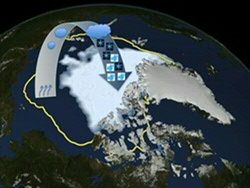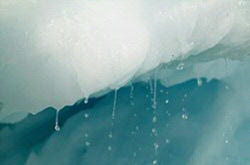Opwarming leidt tot enorme toename regenval in het Noordpoolgebied
De Arctische regionen staan bekend om hun diepvriestemperaturen, vooral in de winter, wanneer het met regelmaat -40°C of kouder wordt. Tegelijkertijd warmt het Noordpoolgebied vooral in de winter sterk op: drie keer zo snel als de rest van de wereld.
Drie jaar geleden hebben onderzoekers van het KNMI al vastgesteld dat deze sterke Arctische opwarming zal leiden tot meer neerslag (tot wel 60%), maar de impliciete aanname was dat vanwege de lage temperaturen deze extra neerslag vooral in de vorm van sneeuw zou gaan vallen. Richard Bintanja, werkzaam bij het KNMI en sinds 1 maart 2017 aangesteld als honorair hoogleraar bij het Energy and Sustainability Research Institute van de RUG, en Olivier Andry hebben nu vastgesteld dat de toename in Arctische neerslag vrijwel uitsluitend in de vorm van regen zal plaatsvinden.
In hun artikel in Nature Climate Change van 13 maart 2017 “Towards a rain-dominated Arctic” laten zij zien dat deze toename in regenval te wijten is aan de enorme opwarming van het Arctische gebied, zodat de neerslag (die begint als sneeuw) in de warme atmosfeer smelt en als regen de grond zal bereiken. Zij laten bovendien zien dat neerslag in het Noordpoolgebied, nu nog gedomineerd door sneeuwval, aan het eind van de eeuw voornamelijk in de vorm van regen zal gaan vallen. Dit zal enorme consequenties gaan hebben, bijvoorbeeld voor de afsmelting van sneeuw, gletsjers, zee-ijs en permafrost (waardoor mogelijk meer methaan zal vrijkomen), voor allerlei ecosystemen die van vers water afhankelijk zijn maar ook voor de mens in de vorm van ijzel en de daarbij behorende infrastructurele problemen.
Voor meer informatie kunt u contact opnemen met Richard Bintanja:
e-mail: bintanja gmail.com
telephone: 06-37565005


